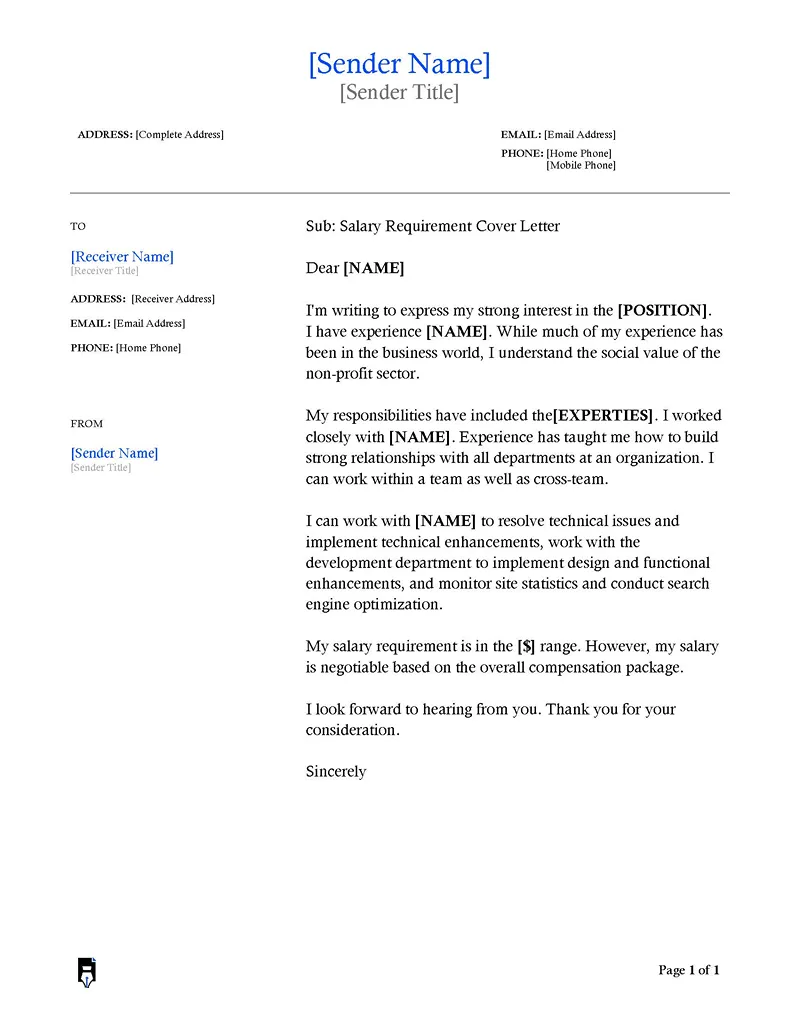Understanding Salary Requirements in Cover Letters
Navigating the topic of salary in your cover letter can feel tricky, but it’s a crucial aspect of the job application process. Knowing how to address salary expectations effectively can significantly increase your chances of landing an interview and ultimately, securing the job. Many job seekers struggle with the balance between showcasing their value and appearing too demanding or unrealistic. This guide will help you master the art of incorporating salary requirements into your cover letter, increasing your professionalism and chances of getting hired. The aim is to provide a clear understanding of when, how, and why you should include this information, along with practical examples and common pitfalls to avoid. It’s about presenting yourself as a confident and informed candidate who understands the value of their skills and experience while remaining open to negotiation.
Why Include Salary Expectations
Including salary expectations in your cover letter, when appropriate, can be a strategic move. It demonstrates that you’ve considered the role and have a clear idea of your worth. This shows initiative and a proactive approach to the job search. Providing this information up front can save both you and the employer time, especially if your expectations are significantly different from the offered salary range. While it’s not always mandatory, including a salary range can highlight your interest in the position and your understanding of the industry standards. However, it’s essential to weigh the pros and cons of this decision to make the best choice for your specific situation, job market, and experience level.
Benefits of Transparency
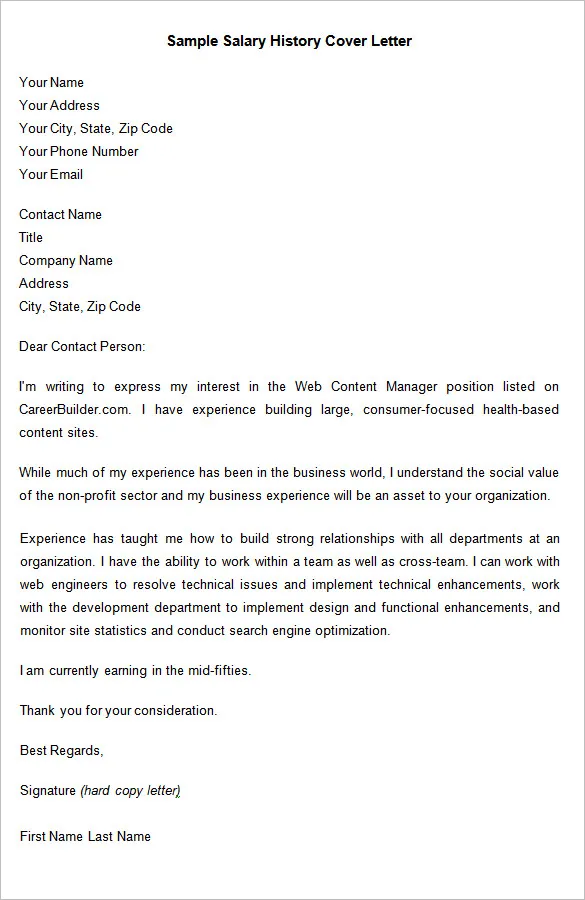
Transparency about your salary expectations can foster trust and demonstrate professionalism. It shows you’re upfront about your needs and expectations, which can be attractive to employers who value clear communication. It can expedite the hiring process by immediately aligning your expectations with the job’s budget. Furthermore, being transparent can sometimes lead to a more transparent negotiation process later on, where both parties understand the constraints and potential for adjustment. Transparency can also help you assess whether a role is a good fit for your financial goals early in the process, saving you time and effort.
Potential Downsides
There are also potential downsides to including your salary requirements. You might inadvertently price yourself out of a role if your expectations are too high. Conversely, stating a salary that’s too low could undervalue your skills and experience. Moreover, some employers might use your stated salary to their advantage, possibly offering you less than what they’re actually willing to pay. Therefore, carefully consider the timing and phrasing of your salary expectations. Before deciding, consider the employer’s request, whether it’s explicitly stated in the job posting or application. Consider the norms of the industry and your level of experience.
Crafting the Perfect Salary Statement
Creating the ideal salary statement requires careful thought and strategic execution. Your goal is to communicate your financial needs without appearing demanding or inflexible. It’s essential to strike a balance between being specific and remaining open to negotiation. Researching salary ranges, using appropriate negotiation phrases, and formatting your statement effectively are crucial steps in this process. Remember, your aim is to showcase your value while leaving room for discussion. This is a critical opportunity to impress the employer. Always adjust your approach based on the specific job and company you’re applying for. The key lies in a proactive approach.
Researching Salary Ranges
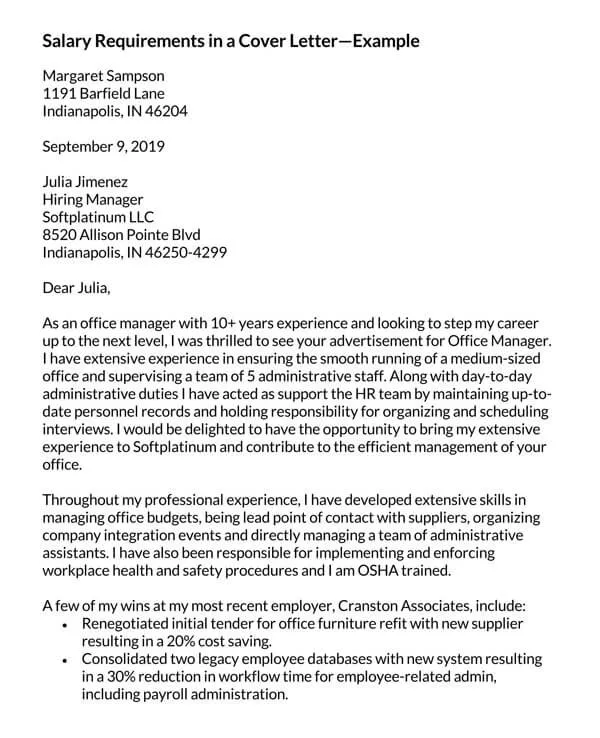
Before composing your salary statement, research the average salary range for the role and your experience level. This knowledge empowers you with data to support your expectations and negotiate effectively. Websites like Glassdoor, Salary.com, and Payscale provide valuable salary data, allowing you to compare salaries based on job title, location, experience, and skills. Furthermore, consider industry standards and company size, as these factors influence compensation. By gathering this information, you can create a well-informed salary range that is realistic and competitive. Thorough research not only prepares you to state your requirements confidently but also demonstrates your understanding of the job market.
Using Salary Negotiation Phrases
The language you use in your cover letter matters. When stating your salary expectations, use phrases that convey both your needs and your flexibility. Instead of saying, “I require a salary of $X,” consider phrases such as “My salary expectations are in the range of $X to $Y,” or “I am looking for a position with a salary competitive to my experience.” Phrases like these show that you’ve done your homework and are open to negotiation. Consider also, “I am flexible, and I’m very interested in discussing the role and compensation in more detail.” These examples ensure your professionalism. Tailor the phrases to the specific role and company culture, ensuring your approach is both confident and respectful.
Formatting Salary Expectations in Your Letter
The way you format your salary expectations in your cover letter is crucial. While some job applications may require you to input the salary in a specific field, most of the time, you have more flexibility to format it in your own words. Generally, it’s best to include the salary expectations near the end of the letter, after you’ve highlighted your relevant skills and experience. Use clear and concise language, avoiding any ambiguity. For example, “I am seeking a position with a salary between $XX,000 and $YY,000.” Always be professional and polite. If the job posting explicitly asks for a salary, make sure you address it directly. Make your expectations easy to find and understand.
Top 5 Tips for Cover Letter Salary Requirements
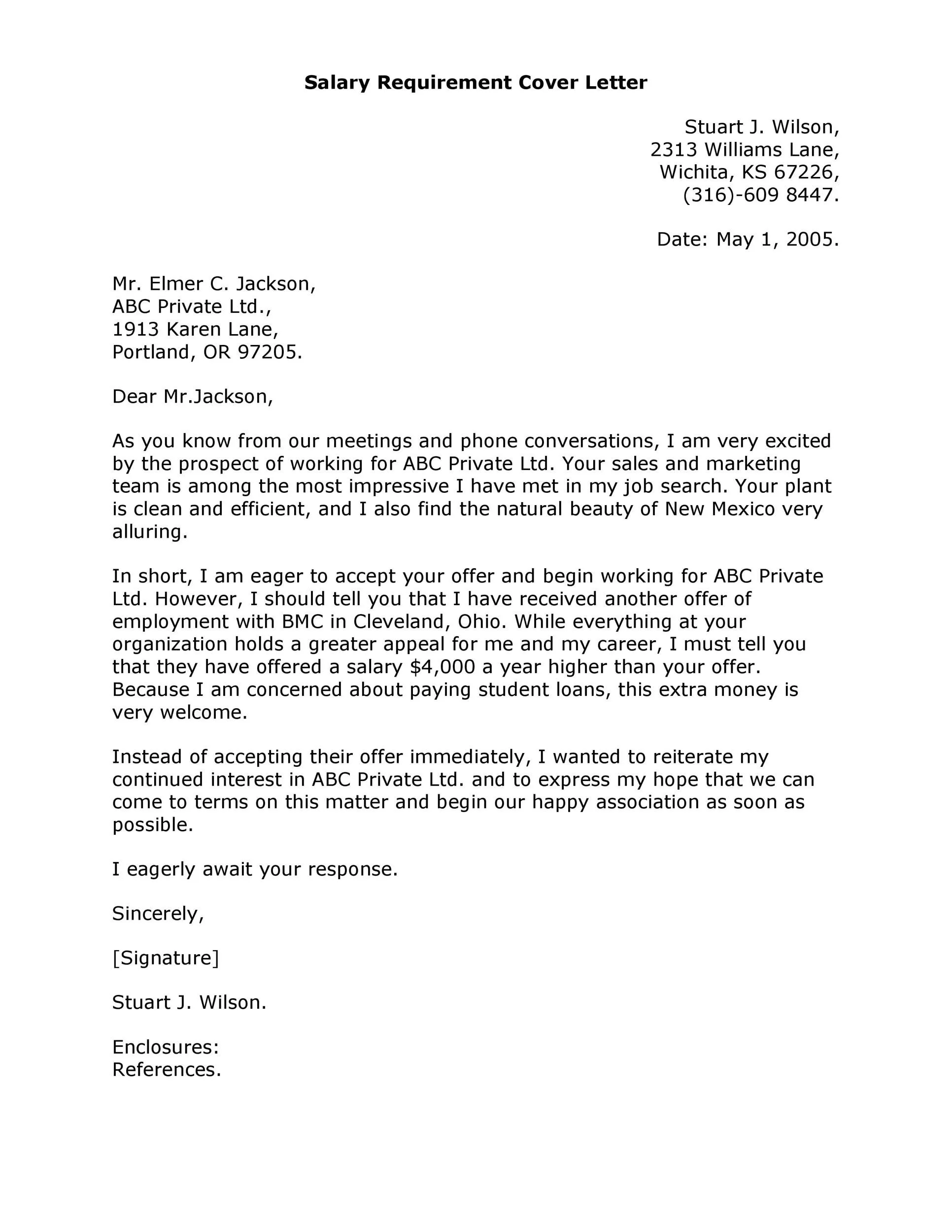
Here are five essential tips to keep in mind when including salary requirements in your cover letter. These tips are designed to help you create a cover letter that is not only informative but also enhances your chances of securing an interview. By following these guidelines, you can confidently present your salary expectations while leaving a positive impression on potential employers. Remember that each application is unique. So, tailor these tips to align with the specific requirements and culture of the company you’re applying to.
Be Specific and Realistic
Avoid vague statements like, “competitive salary.” Instead, provide a specific salary range that reflects your research and experience. Make sure your expectations align with industry standards and the role’s requirements. Being realistic demonstrates your understanding of the market and your value. This also helps employers quickly assess whether your expectations align with their budget. The goal is to show you’ve considered your worth without over or underestimating your value. Accurate market research is the key to providing a reasonable range that is both attractive and achievable.
Frame It Positively
Present your salary requirements in a positive and confident tone. Instead of focusing on your needs, emphasize what you bring to the table. Frame your statement as an investment in your skills and experience. Highlight the value you offer and how your salary aligns with the company’s success. This approach focuses on your contributions. Emphasizing your value creates a more favorable impression and encourages employers to see you as a solution to their needs. This also shifts the conversation from cost to value, ultimately increasing your chances of receiving an offer.
Consider the Employer’s Perspective
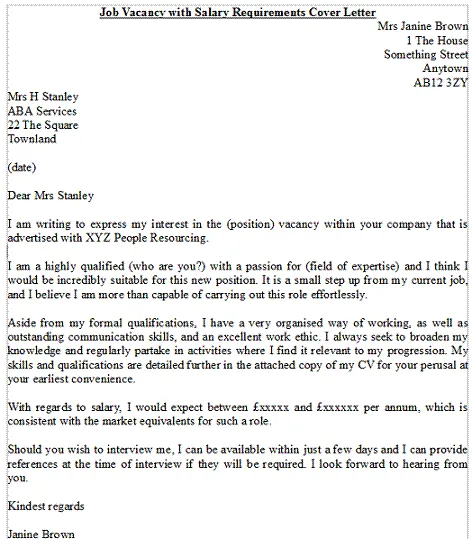
Put yourself in the employer’s shoes. Understand their budget and what they’re looking for in a candidate. Tailor your salary expectations to the company’s size, location, and industry. If the job posting provides a salary range, align your expectations accordingly. If not, research the market thoroughly to provide an informed range. Considering the employer’s perspective shows you’re a thoughtful candidate. It also indicates that you appreciate the company’s financial situation. It increases your chances of being viewed as a good fit and simplifies the negotiation process. Make sure your expectations align with the benefits being offered as well.
Provide a Salary Range
Instead of stating a single number, provide a salary range. This demonstrates flexibility and willingness to negotiate. Research the market and identify a realistic range. The bottom of the range should be the minimum you’re willing to accept, while the top should reflect your ideal salary. This approach allows room for discussion and ensures that you remain open to the opportunity. When specifying a range, make sure the difference between the minimum and maximum isn’t too large, as this could seem unrealistic. Keep the range in a reasonable window so the employer does not think you lack focus.
Be Prepared to Discuss Your Expectations
Once you’ve stated your salary expectations, be prepared to discuss them in more detail during the interview. Have a clear understanding of the factors that influence your salary, such as your experience, skills, and the job responsibilities. Be ready to justify your range with concrete examples and achievements. Being prepared demonstrates your professionalism and readiness to engage in a productive conversation. Preparing allows you to effectively articulate your value and negotiate a compensation package. You can also address any questions the employer may have and be flexible in the discussion. If it comes down to it, know what you are willing to compromise on.
Examples of Effective Salary Statements
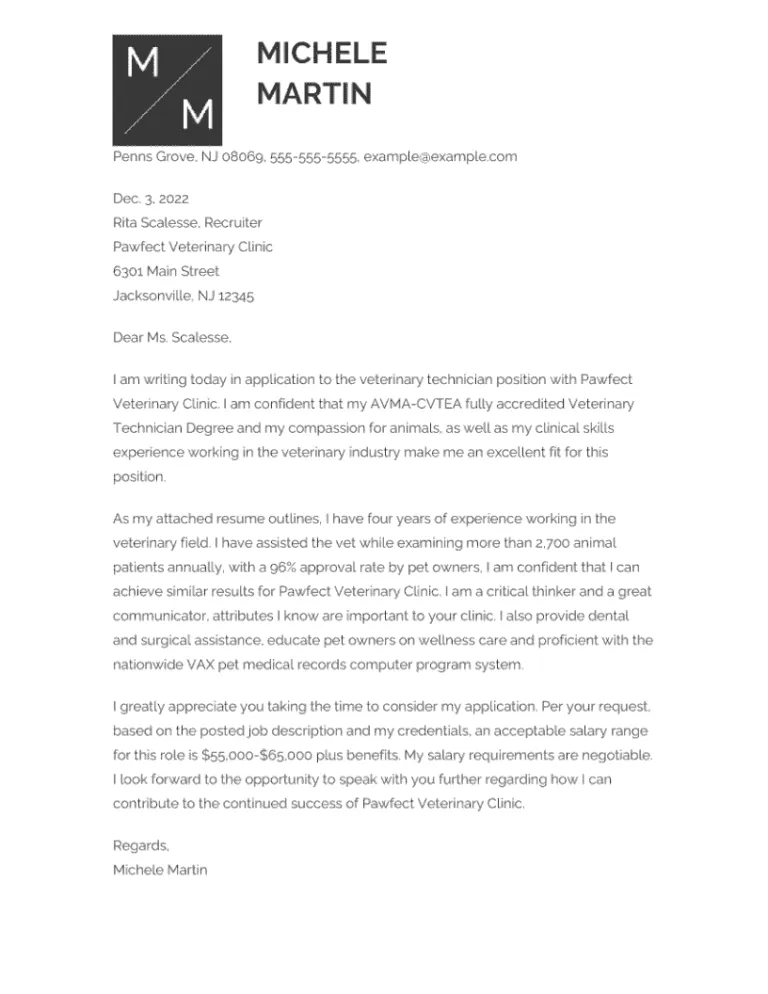
Here are examples of how to incorporate salary requirements into your cover letter based on different scenarios. Use these examples as a guide to craft a statement that suits your experience level and the specific job you’re applying for. These examples will give you some templates to learn from and to modify for your own needs. Keep in mind that the phrasing should always align with your personal brand and the tone of your cover letter. Adapt these templates to fit your own circumstances.
Example 1 Entry-Level Position
“I am seeking an entry-level position and my salary expectations are in the range of $45,000 to $50,000 annually, depending on benefits and the specific responsibilities of the role. I am enthusiastic about the opportunity to contribute to your team and I am eager to develop my skills within your organization.” This shows a willingness to negotiate and highlights your eagerness to learn and grow within the company. It also provides a narrow range that is easily within reach.
Example 2 Experienced Professional
“Based on my experience and the requirements of the position, my salary expectations are between $80,000 and $90,000 per year. I am confident that my skills in project management and team leadership align with your needs, and I am open to discussing the details of the compensation package during the interview stage.” This demonstrates confidence and outlines the candidate’s value based on their experience. It’s also more flexible than just giving a hard number.
Example 3 Flexible Approach
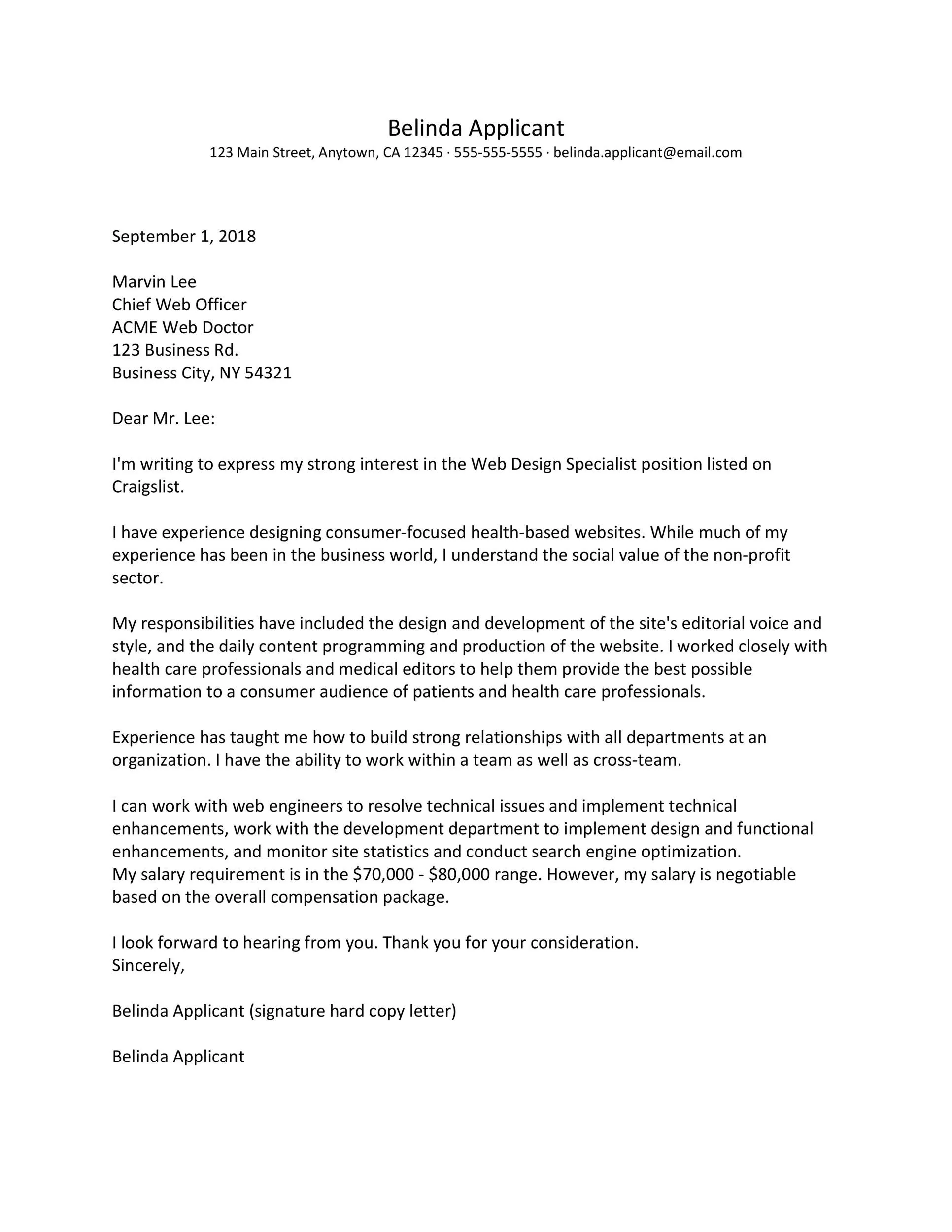
“While I am eager to learn more about the specifics of this opportunity, my salary expectations are competitive to my experience. I am open to discussing the compensation based on the responsibilities, and I am confident that we can reach an agreement that is mutually beneficial.” This is a more flexible approach suitable for candidates who may be less certain about the industry standard or wish to emphasize their flexibility. It’s useful when you want to focus on the role and responsibilities.
Common Mistakes to Avoid
Avoid these common mistakes when including salary requirements in your cover letter to present yourself effectively. Be sure to recognize the potential pitfalls and avoid them. Making these errors may harm your chances of receiving an interview. Understanding these mistakes can help refine your approach. So be mindful of how you present yourself to potential employers.
Mentioning Salary Too Early
Unless the job posting specifically requests it, avoid mentioning salary requirements in the very first paragraph of your cover letter. This can shift the focus from your qualifications to your financial expectations too soon. Instead, introduce yourself, highlight your relevant skills, and express your interest in the role first. Save the salary discussion for the end of your letter or until requested. This gives the reader a chance to appreciate your skills and qualifications before focusing on money. Always prioritize highlighting your value before discussing financial aspects.
Demanding an Unrealistic Salary
Do not demand a salary that’s significantly higher than the market rate for the role and your experience. This may lead to the employer immediately dismissing your application. Research the industry standards and the typical salary range. Consider your experience and qualifications, and then set your expectations accordingly. While it is important to know your worth, it’s equally important to be realistic. Being too demanding can make you appear out of touch with the market.
Being Vague or Unclear
Avoid being vague, such as saying, “I am looking for a competitive salary.” This statement offers little to no helpful information to the employer. Provide a specific salary range or the lowest acceptable salary. Research industry standards to determine the range for your experience. When you’re clear, it shows you are prepared and understand the market value. Remember, vagueness may be perceived as a lack of preparedness or a disinterest in the role.
Conclusion
Including salary requirements in your cover letter is a strategic decision that, when done correctly, can significantly boost your chances of success. By understanding the benefits, potential downsides, and following the expert tips provided, you can confidently navigate this part of the job application process. Remember to research the market, use professional phrases, and remain flexible. Knowing how to address your salary expectations in a cover letter is an investment in your career. It helps to establish yourself as a well-prepared candidate. Use the provided examples and tailor them to your specific needs, and you’ll be well on your way to making a positive impression.
